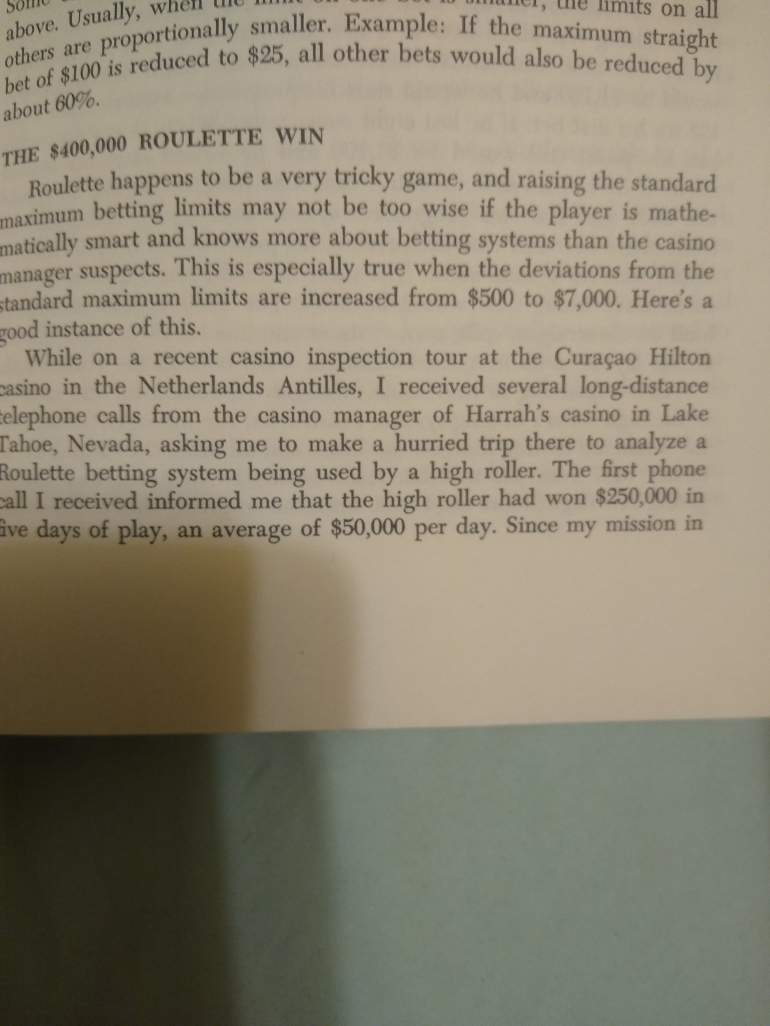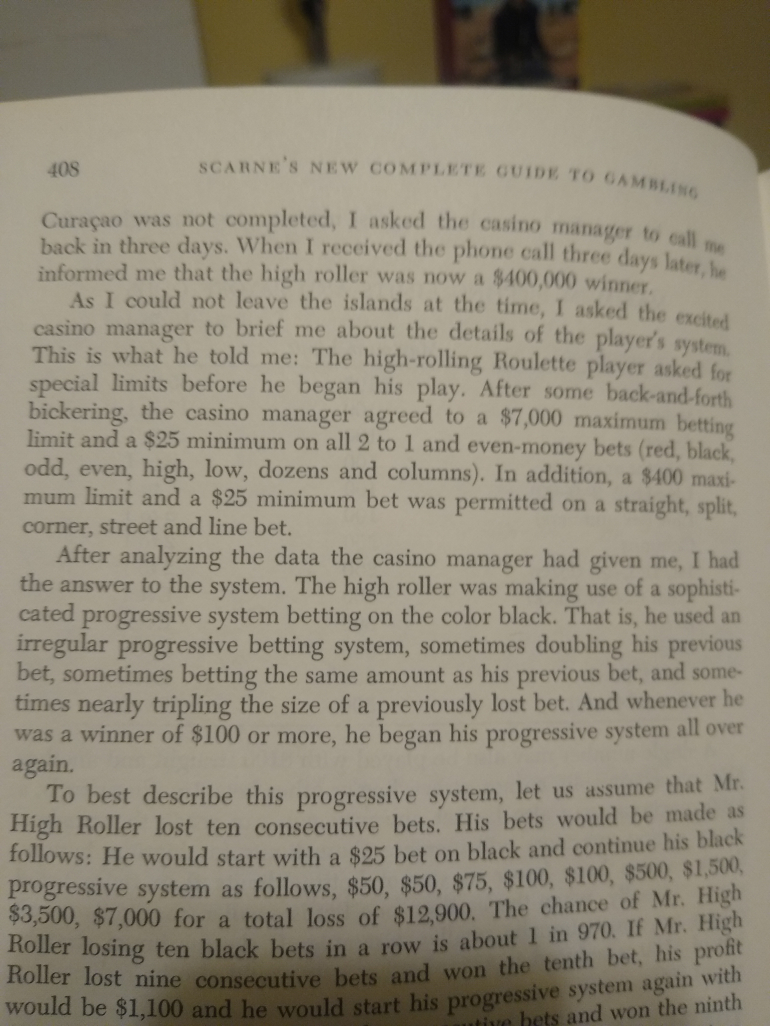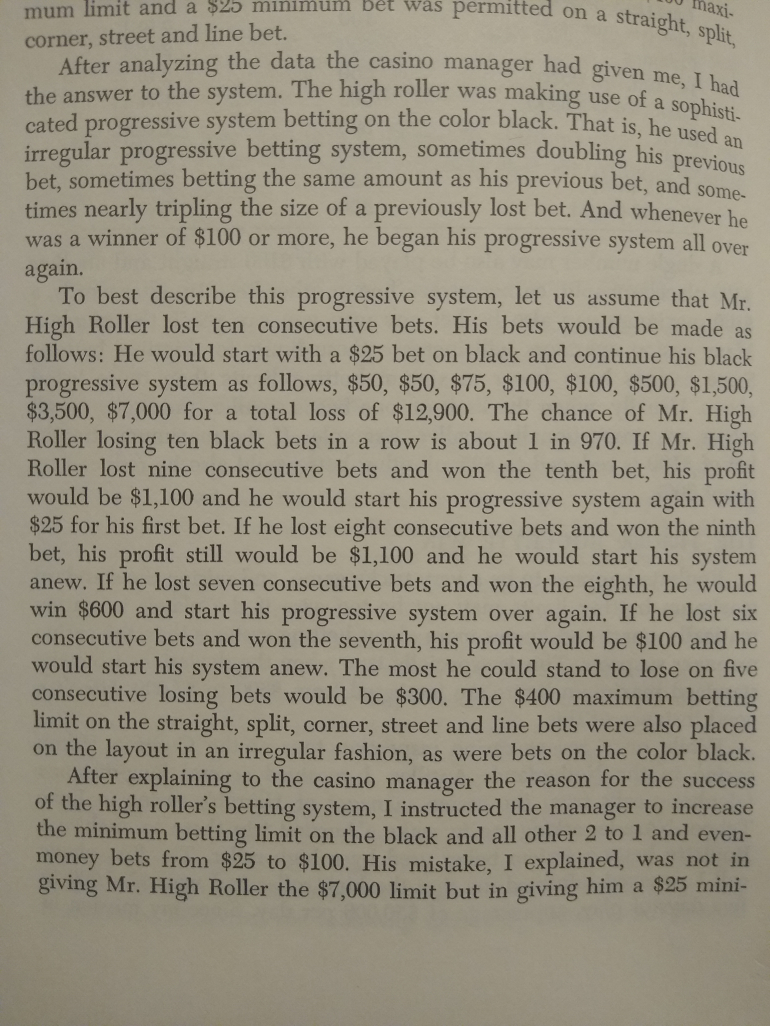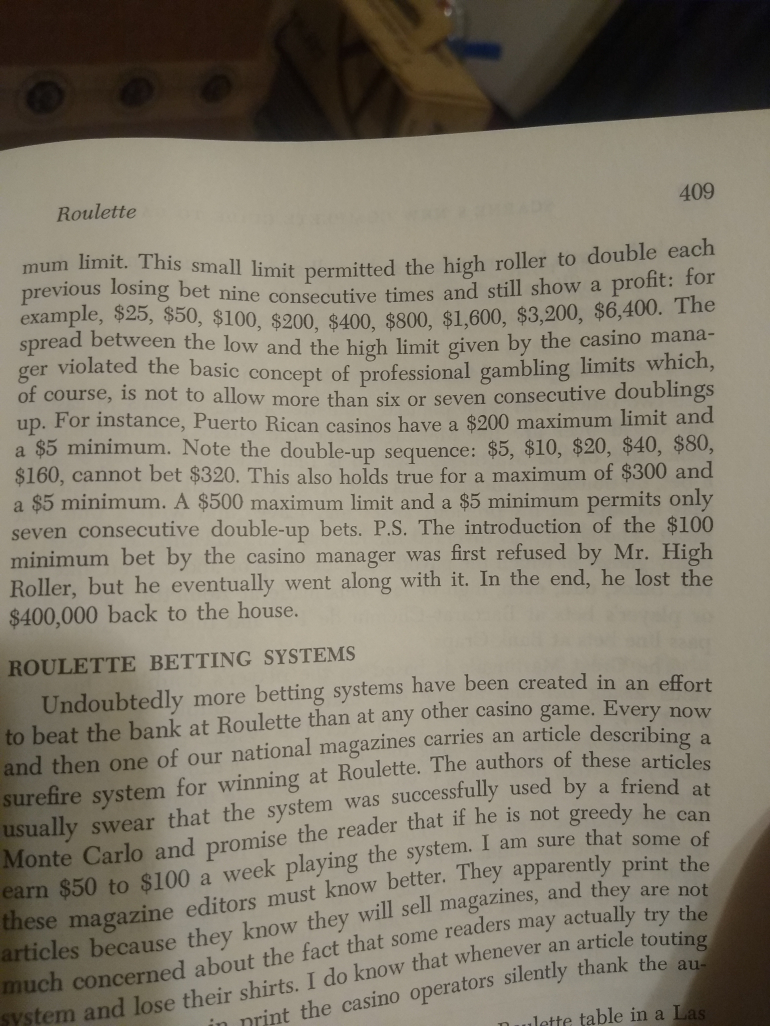Thread Rating:
It's in his book "Scarnes new complete guide to gambling" pages 407-409.
He details how a player won $400,000 in a little over a week using a progressive Marty style wager by convincing the casinos to stretch their minimum and maximum limits AT ROULETTE!!!
He doesn't discuss the long term. But he discusses the system as if it has some force of success.
Below is the relevant chapter.
This was delineated in regards to the -5.26% edge of roulette. So could this same system be used at the much better game of Baccarat?
What is the mathematical breakdown and simulation? Also, remember that MDawg cross utilizes a raising positive progression on streaks.
And finally, streaks are probably defined as three types.
All Banker
All Player
Alternate Player/banker.
What would be the odds of not hitting one single variation of those with the Scarne system of raising wagers (I probably shouldn't call it Scarnes system since he only related what he observed another player doing.)
At any rate, unless Scarne's story is bunk, this should be analyzed seriously




Quote: billryanStarting yet another thread about this should result in a long suspension.
I don't think anyone has started a thread about Scarne besides me.
Plus I think my recent donation should give me some clemency
I asked if Scarne was a reliable source of mathematical information and several including the Wizard said yes.
So is he or is he not to be taken seriously with this chapter?
Quote: darkoz
And finally, streaks are probably defined as three types.
All Banker
All Player
Alternate Player/banker.
Is this what Mdawg does, waits for streaks? Most bac players wait for the streaks, especially the chop streaks. This is certainly nothing special. If you see a long streak on the table you will have people standing behind the seated players making bets. This is the most basic of moves in baccarat, betting the streaks. There are streaks in roulette, obviously, I believe the ones in baccarat happen more often and are longer. You can have a shoe where there are no streaks and the next shoe will be all streaks. The problem with the no streak shoe is you don't know it's a no streaks shoe till it's over. You will lose your money betting on streaks that never happened. What I mean is, you see five Bankers in a row thinking it's a streak so you bet, and it ends on the next hand.
Quote: EvenBobIs this what Mdawg does, waits for streaks? Most bac players wait for the streaks, especially the chop streaks. This is certainly nothing special. If you see a long streak on the table you will have people standing behind the seated players making bets. This is the most basic of moves in baccarat, betting the streaks. There are streaks in roulette, obviously, I believe the ones in baccarat happen more often and are longer. You can have a shoe where there are no streaks and the next shoe will be all streaks. The problem with the no streak shoe is you don't know it's a no streaks shoe till it's over. You will lose your money betting on streaks that never happened. What I mean is, you see five Bankers in a row thinking it's a streak so you bet, and it ends on the next hand.
I don't know what MDawg does except he has described a lot in detail to be taken with a grain of salt.
But he seems to wager with a Marty of sorts until one win gets him back his profits while simultaneously raising into a streak.
Theoretically he doesn't have to "catch one" as he is always wagering.
Streak - raise
Losses - raise until single win
There is no such thing as a "sophisticated" betting system. They are all equally worthless.
Quote: WizardI happen to have that book and read that part. My respect for Scarne went down a couple pegs after reading it. Had this casino called me for advice, I would have said roll out the red carpet for said player and keep him playing as long as you can. You'll eventually win it all back and more as long as he keeps playing.
There is no such thing as a "sophisticated" betting system. They are all equally worthless.
Okay nuff said.
Thanks
I think Scarne knew how hard it would be to get good sales on a gambling book without showing at least one easy money system
so he lied, and gave the buying public a pipe dream
I'm sure he knew the system was bogus
*
Quote: lilredrooster......................
I think Scarne knew how hard it would be to get good sales on a gambling book without showing at least one easy money system
so he lied, and gave the buying public a pipe dream
I'm sure he knew the system was bogus
*
Meh I don't think so
It's buried almost without fanfare on pages 407-409 of an almost thousand page book.
If that was his plan he would have opened the book with the anecdote so casual readers at bookstore's would come across it on page one.
Just my opinion.
he was obviously very bright - he showed it in his analysis of poker and other games - yeah, I know - he made an error on BJ - doesn't affect this conclusion
it's hard to believe he could actually think an obviously bogus system like that would be a long term winner
*
Quote: darkoz
Quote: scarne... chance of ... losing 10 black bets in a row is about 1 in 970...
Where'd he get that?
For Euro roulette, (19/37)^(-10)= 1 in 784
For US roulette, (20/38)^(-10)= 1 in 613
No zero roulette (18/36)^(-10)= 1 in 1024
Hmmmmm. Maybe he's looking at Euro game with partage rule that returns half of stake on zero. But then his "losing 10 in a row" is a bit of a misdirection
Quote: darkozI don't think anyone has started a thread about Scarne besides me.
Started, probably not, but if you go through my posts and find some that say something along the lines of, "One of the reasons table maximums exist is to make it much harder for Martingale systems to work," this was my source.
Of course, there was also a time I swore by his (no-count) blackjack strategy (mentioned in chapter 13 of the same book):
Ace: stand on 16 (soft 19) (double 10,11)
2, 3, 4: stand on 13 (soft 18) (double 9,10,11)
5: stand on 12 (soft 18) (double 9,10,11)
6: stand on 12 (soft 18) (double 9,10,11,soft 12-17)
7: stand on 17 (soft 18) (double 10,11)
8, 9: stand on 17 (soft 19) (double 10,11)
10: stand on 16 (soft 19) (double 11)
Splitting:
Aces: always ("even if the rules limit you to one card per Ace")
2s, 3s: only if dealer shows 2-7
4s, 5s, 6s: never
7s: only if dealer shows 5-7
8s: only if dealer shows A-8
9s: never
10s: only if dealer shows 5-6
I was also curious about this. Believe it or not, I think he got to 970 by taking 2^10 (as if you have a 1 in 2 chance of winning a bet on black) times 36/38 (the expected return of American rouletteQuote: OnceDearQuote: darkoz
Where'd he get that?
For Euro roulette, (19/37)^(-10)= 1 in 784
For US roulette, (20/38)^(-10)= 1 in 613
No zero roulette (18/36)^(-10)= 1 in 1024
Hmmmmm. Maybe he's looking at Euro game with partage rule that returns half of stake on zero. But then his "losing 10 in a row" is a bit of a misdirection
If so, Scarne could not do the most basic probability calculation
Quote: WizardI happen to have that book and read that part. My respect for Scarne went down a couple pegs after reading it. Had this casino called me for advice, I would have said roll out the red carpet for said player and keep him playing as long as you can. You'll eventually win it all back and more as long as he keeps playing.
There is no such thing as a "sophisticated" betting system. They are all equally worthless.
I think many people tend to be a bit tough on Scarne. Basically, this is an extremely fundamental principle as we look back upon it with today's knowledge, but let's remember that the casino itself is not really there to gamble...they're there to let the House Edge play out. Scarne analyzed the guy's system and encouraged the house to increase the minimum bet (rather than reduce the maximum bet) thereby taking a step or two of the system away before it gets to max.
I don't think Scarne was saying that there's anything magical about Black not losing ten times in a row as opposed to losing eight or nine times in a row...I think he's just tightening up the guy's betting range to make the probability of winning any given system attempt a bit less so that the casino can get itself back to the good more quickly, by expectation.
If asked directly whether or not to let the player keep playing if the player refused the higher minimum, I like to think that Scarne would have said, "Yes, you're always expected to win eventually."
Quote: FTBOh yeah, just what this forum needed: yet another thread with this guy’s name in the title...
Nice. Name was removed. There’s hope for this forum yet.
OMG!!!!Quote: Ace2I was also curious about this. Believe it or not, I think he got to 970 by taking 2^10 (as if you have a 1 in 2 chance of winning a bet on black) times 36/38 (the expected return of American rouletteQuote: OnceDear
Where'd he get that 970?
For Euro roulette, (19/37)^(-10)= 1 in 784
For US roulette, (20/38)^(-10)= 1 in 613
No zero roulette (18/36)^(-10)= 1 in 1024
If so, Scarne could not do the most basic probability calculation
And that from...
"John Scarne, now deceased, was recognized during his lifetime as the world's foremost expert on gambling. "
Wrong on so many levels, but it does come out at 970.
Quote: Mission146I think many people tend to be a bit tough on Scarne. Basically, this is an extremely fundamental principle as we look back upon it with today's knowledge, but let's remember that the casino itself is not really there to gamble...they're there to let the House Edge play out. Scarne analyzed the guy's system and encouraged the house to increase the minimum bet (rather than reduce the maximum bet) thereby taking a step or two of the system away before it gets to max.
I don't think Scarne was saying that there's anything magical about Black not losing ten times in a row as opposed to losing eight or nine times in a row...I think he's just tightening up the guy's betting range to make the probability of winning any given system attempt a bit less so that the casino can get itself back to the good more quickly, by expectation.
If asked directly whether or not to let the player keep playing if the player refused the higher minimum, I like to think that Scarne would have said, "Yes, you're always expected to win eventually."
yes, I hear you
but on page 409 he writes:
"the spread between the low and the high limit given by the casino manager violated the basic concept of professional gambling limits which, of course, is not to allow more than six or seven doublings up."
really - I never head of that basic concept
but you're right - Scarne wasn't really saying that this is a winning system - I was mistaken about that
*
Quote: lilredroosteryes, I hear you
but on page 409 he writes
"the spread between the low and the high limit given by the casino manager violated the basic concept of professional gambling limits which, of course, is not to allow more than six or seven doublings up."
really - I never head of that basic concept
*
I hadn't either, but I can't say for sure that wasn't how it generally worked at the time. If not as a rule, then perhaps in practice?


